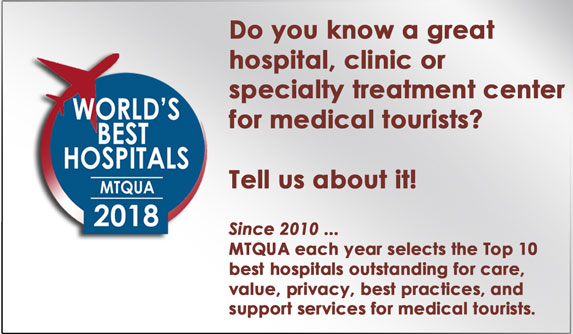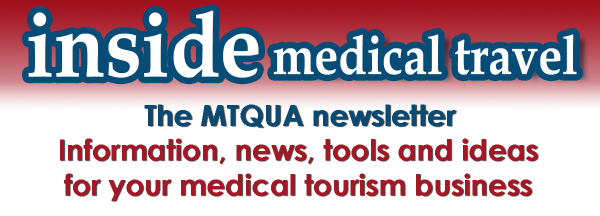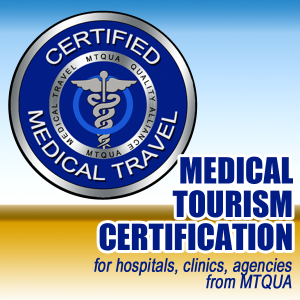FOR IMMEDIATE RELEASE
7 trends to watch in medical tourism in 2016 – a baby boom, hot new destinations, and ethics – from industry leader Medical Travel Quality Alliance.
March 2, 2016 – Bangkok and Scottsdale – A global baby boom in 2016 is one of seven trends and issues that will affect the medical tourism industry this year, according to industry leader Medical Travel Quality Alliance (MTQUA, https://mtqua.org)
“This will be a very interesting year. Prepare for a baby boom in medical tourism and plenty of debate around the kind of treatment medical travelers get in hospitals, and by doctors and agents,” says Medical Travel Quality Alliance president Julie Munro.
Americans will be looking for baby surrogates in countries from Cambodia to Ukraine; Chinese will be looking to America for surrogates and as a place to give birth; and everyone from Australians to Zambians will be asking for gender selection along with advanced and leading edge fertility treatments.
Some agencies and clinics, especially in Bangkok and California, are already preparing to handle up to 300 patients a month.
 “Established agents are going bankrupt, there’s talk of corruption and questionable practices. I expect to see hot debates over ethics and medical traveler rights, especially considering the recent treatment of medical tourists by the Dominican Republic,” says Munro.
“Established agents are going bankrupt, there’s talk of corruption and questionable practices. I expect to see hot debates over ethics and medical traveler rights, especially considering the recent treatment of medical tourists by the Dominican Republic,” says Munro.
MTQUA, a key industry player, providing medical travel certification and standards, medical travel advisories, best practices, and medical traveler bill of rights, identifies these seven key trends and issues for the medical tourism industry for 2016.
1. A medical tourism baby boom.
Traditional fertility treatments, commercial surrogacy contracts, and “birthright” tourism will all see greater numbers mainly because Chinese couples now can have more than one child per family. Many Chinese, Brits, Americans and Australians will also be exploring gene editing, three-person embryo procedures, and other emerging ethically-borderline processes.
2. Demand for guarantees by patients and doctors.
Bankruptcies, rumors of FBI investigations, charges of patient trafficking make medical travelers more careful in choosing facilitators and providers.
3. Growing questions about the quality of results.
The first medical travel advisory on the medical tourism industry, from MTQUA, made many people ask if enough is being done to protect medical tourists from higher risk to their safety and lower quality of care and outcomes.
4. Medical travel specialization in degree and diploma programs at universities and colleges.
Gulf Medical University in Ajman, UAE is among the first to offer formal courses in aspects of medical tourism.
5. The next “hot” medical travel destinations.
As Cuba opens up to American tourists, medical tourism promoters and bloggers are already claiming it is a great treatment choice for medical travelers. Not so fast, say the Cayman Islands and Iran.
6. Slowing of outbound government-sponsored medical travel.
Governments sponsoring outbound medical tourists, such as Dubai, Saudi Arabia, Kazakhstan and Nigeria are cutting back medical travel budgets, searching for cheaper alternative destinations and demanding better clinical outcomes.
7. Certification and accreditation confusion.
Certification and accreditation programs generally suggest that industry leaders have arrived at a consensus for standards and best practices. In medical tourism, this is not the case so far, though progress continues to be made.
The detailed trends report may be found here.
Medical Travel Quality Alliance (MTQUA, https://mtqua.org/), founded in 2009, is an independent international organization that develops and promotes the highest standards of excellence in delivering treatment and care to medical travelers and health tourists. It certifies hospitals, clinics and medical travel service providers worldwide for safety and quality in support of treatment, care and services for medical tourists, and issues an annual list of the Top 10 World’s Best Hospitals for Medical TouristsTM.
CONTACT:
Caroline Bodanis
Email caroline@mtqua.org
Telephone (USA) +1 602-635-4664, (Thailand) +66 85 902 4500



